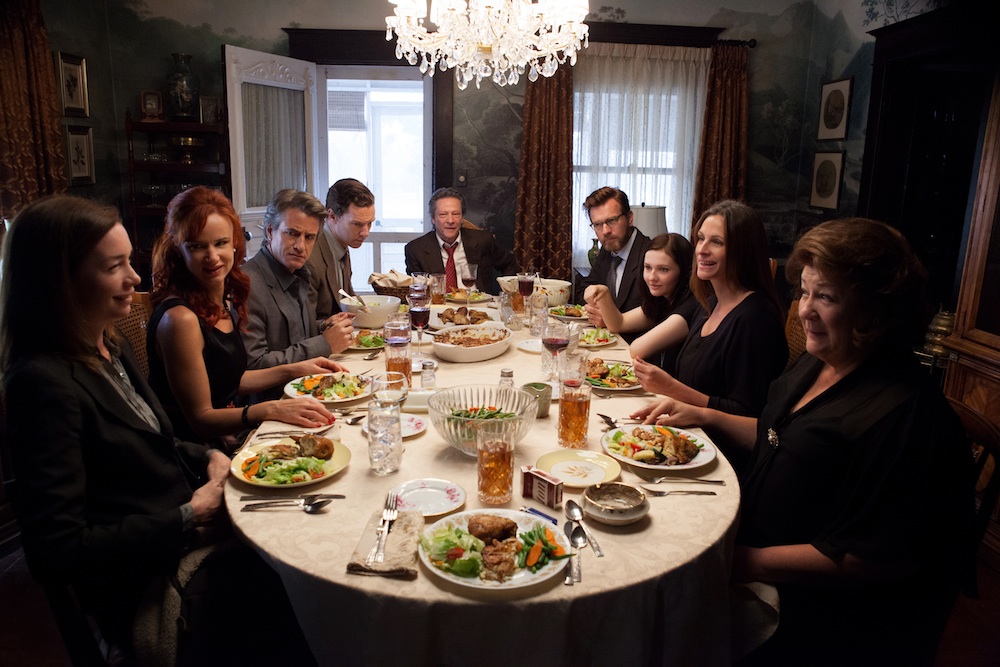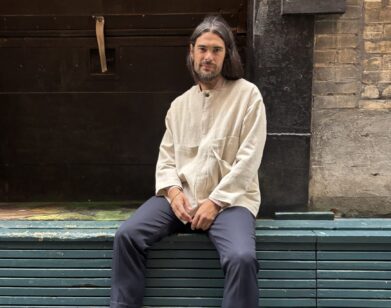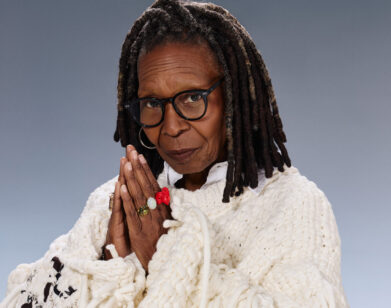Dermot Mulroney & the Pulitzer Prize-Winning Playwrights

ABOVE: (FROM FRONT LEFT) JULIANNE NICHOLSON, JULIETTE LEWIS, DERMOT MULRONEY, BENEDICT CUMBERBATCH, CHRIS COOPER, EWAN MCGREGOR, ABIGAIL BRESLIN, JULIA ROBERTSON, AND MARGO MARTINDALE IN AUGUST: OSAGE COUNTY.
In 2008, the play August: Osage County earned playwright Tracy Letts a Pulitzer and a Tony. The brilliant film adaptation has already garnered Golden Globe and SAG nominations for Meryl Streep and Julia Roberts. We sat down with Dermot Mulroney to discuss the critically-acclaimed film, and his pals Sam Shepard and Julia Roberts.
August: Osage County is the story of the dysfunctional Weston family in Oklahoma. Played by Meryl Streep, matriarch Violet Weston suffers from cancer and a nasty addiction to painkillers. Her husband, Beverly Weston (Sam Shepard), has committed suicide. As Violet’s three daughters (Julia Roberts, Julianne Nicholson, Juliette Lewis) and their families gather for the funeral, skeletons emerge from closets and long-simmering conflicts erupt.
Mulroney plays Lewis’ fiancé—an oft-married, Ferrari-driving realtor from Florida who hits on her 14-year-old niece (Abigail Breslin). He provides comic relief in the film’s tense, climactic dinner table scene, as his phone’s ringtone—the theme song from Sanford and Son—interrupts the mealtime prayer.
Muroney, who plays an ex-CIA analyst in NBC’s upcoming drama, Crisis, met with Interview recently at the Essex House in NYC. Minutes earlier at the press conference, Julia Roberts had this to say about him: “Dermot and I have been great pals since My Best Friend’s Wedding. When we found out that he got this part, we both squealed like little girls. We were so excited for each other, and to be back together. Even when he had a day off, Dermot would run lines with me before I went to work at six a.m. We’d trade it for an exceptionally good cup of coffee! And the whole time, feeling so supported by my old friend. He would come to watch scenes that I was in. It was beautiful to have each other. Especially when we’re all away from our families and forging new relationships, it was nice to have my rock steady there.”
LORRAINE CWELICH: What specifically interested you about Tracy Letts’ writing?
DERMOT MULRONEY: Often when I think of Tracy Letts, I think of Sam Shepard’s writing, which was my greatest inspiration as a student actor. Subsequently, I’ve worked with Sam four times and we’ve become friends. So I guess any modern American theater for me is seen through that lens. So picture me at a table reading with two Pulitzer Prize-winning playwrights: I kind of have an eye on my buddy Sam while this language is rolling over us all. We get to that point in the play where it’s about to be revealed that there’s some incestuous activity going on and I believe I detected glee in Sam Shepard’s eyes! Because, of course, his plays are rife with weird families and buried bodies.
CWELICH: Sam’s character’s presence lingers throughout the film. Is he as elusive in real life as his image—the solitary cowboy/writer?
MULRONEY: He’s actually gotten to be more cantankerous as the years go by. [chuckling] So you have to have already known him before, or you may not get to know him now. Like, “Time’s up!” He’s not entertaining any new guests. But he was whole-hog on this movie. He really put his soul into it. Instead of staying in the city, he asked for a house in the middle of nowhere, so that he could write. I drove out to where he was staying. It was just sunset and he was walking up this dirt road from the house they’d rented, and he’s running his lines. The sun is setting and there’s Sam Shepard in a field, with a screenplay in his hand. I couldn’t believe it. And then we went in and he cooked me a steak and some broccoli. He travels with a typewriter and he writes on that. Not a laptop, a typewriter. And his Gibson guitar.
CWELICH: It’s like that visual of him and Patti Smith pushing the typewriter back and forth on the kitchen table when they wrote Cowboy Mouth (1971).
MULRONEY: I believe it’s the same typewriter. This role was originated by Tracy Letts’ father at Steppenwolf and then they brought it to New York. He passed away during the run of the play.
CWELICH: It was heartwarming to hear Julia talk about your friendship during the press conference. Tell me about her.
MULRONEY: I’ve met all her boyfriends, then her husband and true love, Danny. We’ve watched each other start families, and move houses; we’ve remained in each other’s lives. Now, obviously, everybody who’s an actor makes friends on a film, but it’s rare that those friendships sustain, because of the nature of the business. Ending a movie’s like the end of summer camp; you know that you’re probably not going to see these people again. I was great friends with Rupert [Everett] and Cameron [Diaz] too, but for whatever reason, those friendships didn’t sustain in the same way. Julia and I were just very compatible. I remember walking into that audition and thinking, “I’ll get this part because she’s going to be my friend.” It’s weird, I had that intuitive sense. We’re both Scorpios. She’s been enormously generous. When I had my second child, she arranged for a week’s worth of prepared food to be delivered to my house, and she barely knew my wife at that time. They’re friends now. Just gestures like that over the years. It’s a true, deep, rich friendship.
CWELICH: She also seems really funny offscreen.
MULRONEY: Yes, part of that is because she’s so brilliant. The words that come out of her mouth are always, always, precisely structured. Just everything she says sounds like a quotable thing! I’ve seen her in front of people at award events, speaking extemporaneously in a way I never could—and she’s not nervous. She’s super-smart. All the things people love about her—her beauty and laugh and humor and friendliness—is from her brain. That’s what’s beautiful about her; how intelligent she is. I’ve always argued that you can be truly dumb and be a great actor, but I’m beginning to doubt it. The great ones are smart.
CWELICH: In this film, your character could be considered smarmy. Assuming that you don’t have much in common with him…
MULRONEY: Nope, I don’t drive Ferraris or hit on underage girls…
CWELICH: So how do you approach a character that’s so different from yourself?
MULRONEY: That’s always fun to play. There are early warning signs that he’s inappropriate. But he’s also lovable, and you want Karen to have a good man. He’s modest and friendly and a good fit for her. As with any great character, there’s a turn, which makes it fantastic. Every character becomes someone they weren’t or is revealed to be someone we didn’t know. Steve’s is just one of the more egregious shifts.
CWELICH: Most audiences know you from your leading-man roles in romances like My Best Friend’s Wedding and The Family Stone. You’ve also done so much dramatic character acting. Do you have a preference?
MULRONEY: I love acting so much that I love it all. I struggled for years with the perception that all I did was romantic comedies. That’s what people knew, rather than the dramas. But I’d do a romantic comedy again in a heartbeat. I like doing character work in romantic comedies the most. About Schmidt is the one I’m thinking of—because Alexander [Payne] casts actors in such unexpected ways, really against their type. He sure did that with me.
CWELICH: You seem to really have fun playing the creepy guy in this film.
MULRONEY: Oh, hell yeah! I’m expected to be the nice, romantic guy here, and then it turns.
CWELICH: Talk about filming the dinner scene.
MULRONEY: It took four days to film. Meryl never once dropped a line, not a word. I’m the one at that table who nobody knows, and who knows no one. It’s revealed to Steve what he actually has walked into. Those four days were the most memorable I’ve had in 28 years of film acting.
AUGUST: OSAGE COUNTY OPENS IN LIMITED RELEASE ON DECEMBER 27 AND NATIONWIDE ON JANUARY 10.






